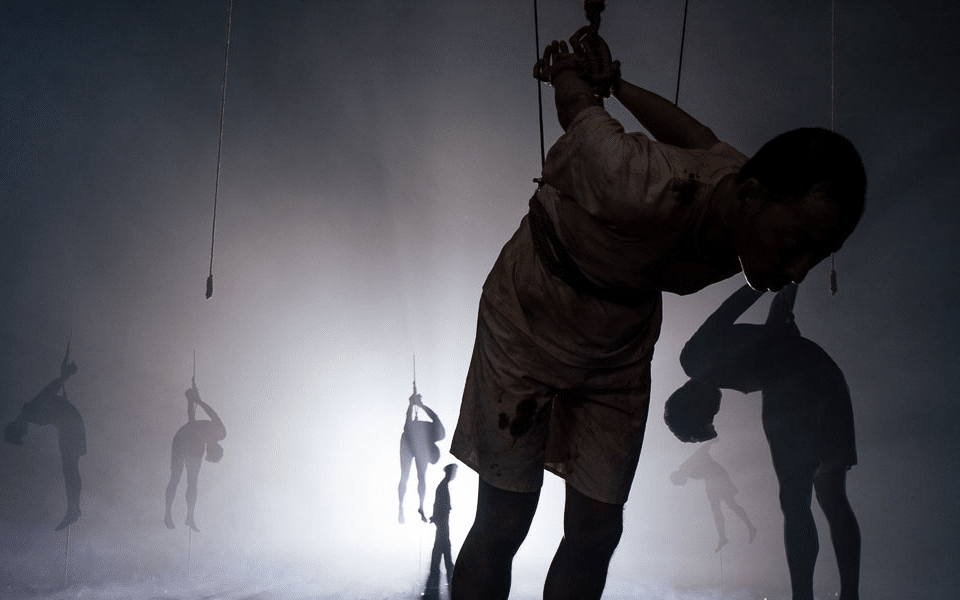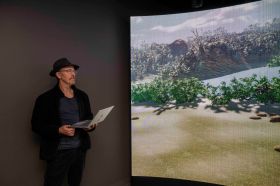A selection of extended reality (XR) – spanning virtual reality, augmented reality and mixed reality – experiences were presented as part of Melbourne International Film Festival (MIFF) 2023. Phase one of the program included eight international works, with storytelling across history, civilisation, fairy tale worlds and dystopian soundscapes.
Each XR experience required individual booking, and was situated in booths inside ACMI’s Swinburne Studio.
Limbotopia in VR is a virtual reality experience adapted from a film by Taiwanese director Hsieh Wen-Yee, adapted from the architecture design by Chun-Lien Cheng – its cinematic and architectural qualities are immediate. An immersive soundtrack by Aaron (Wei-Han) Wu guides viewers through a post-apocalyptic landscape, the atmosphere shifting from ominous to tranquil.
In the desert ruins of past civilisation, the wind blows words across the screen that say ‘Wake up, can you hear them sing?’ The feeling of being lost is carried across this meditative journey of equal parts destruction and discovery.
Loneliness and isolation come to the fore in a scene that places viewers in a train cabin with a lone figure, head down and silent, and largely reminiscent of the sea railway in Hayao Miyazaki’s (Studio Ghibli) 2022 animated film, Spirited Away.
Limbotopia in VR also draws upon religious motifs that speak to the cycle of life and deterioration. While the man-made landscape crumbles, trees glow and thrum with energy.
The Man Who Couldn’t Leave is part documentary, part history museum tour and part theatre, spotlighting the story of Taiwan’s political detainees during the White Terror of the 1950s under the Kuomintang-ruled government. Director Singing Chen has drawn on archival documents to stage this confronting retelling of trauma, family, courage and longing.
The storyline, which is presented in full 360 degrees through the virtual reality headsets, prompts physical, psychological and mental engagement. It is mainly told through the narrative of A-Kuen, a former prisoner and survivor, and focuses on the struggles and sacrifices of men who were executed on Green Island. The prison camps have now been transformed into the National Human Rights Museum.
Read: MIFF 2023 snapshots: opening weekend
There are times when these virtual reality experiences open up a portal, but the question remains – why VR? It seems to this reviewer that aspects of Limbotopia – cinematic visuals, immersive sound and the quiet narrative – could just as well been communicated in its original form, film. For a story that speaks of isolation, the secluded experience of sitting in a booth, alone, feels at best, unnecessary. Add to that ill-fitting headsets (50 years after their invention!) and the extra bulk of external headphones, one cannot help but wish to be inside a cinema, surrounded by others who are sharing the experience.

For The Man Who Couldn’t Leave, the VR experience was haunting, matching the gruesome history it was trying to highlight. But there comes a time when such visual proximity with the subjects and their varying states of distress spurs disconnection rather than engagement – a distance often delicately mastered and maintained in theatre.
Despite good narratives with all the right intentions, the future of VR would be doing itself a disservice if it cannot accomodate the physical experience in favour of transporting the mind.
MIFF XR presented its Phase One program from 8-15 August, and Phase Two (In Pursuit of Repetitive Beats) 17-20 August at ACMI’s Swinburne Studio, in partnership with HTC VIVE; ticketed.
Actors:
Director:
Format:
Country:
Release:





